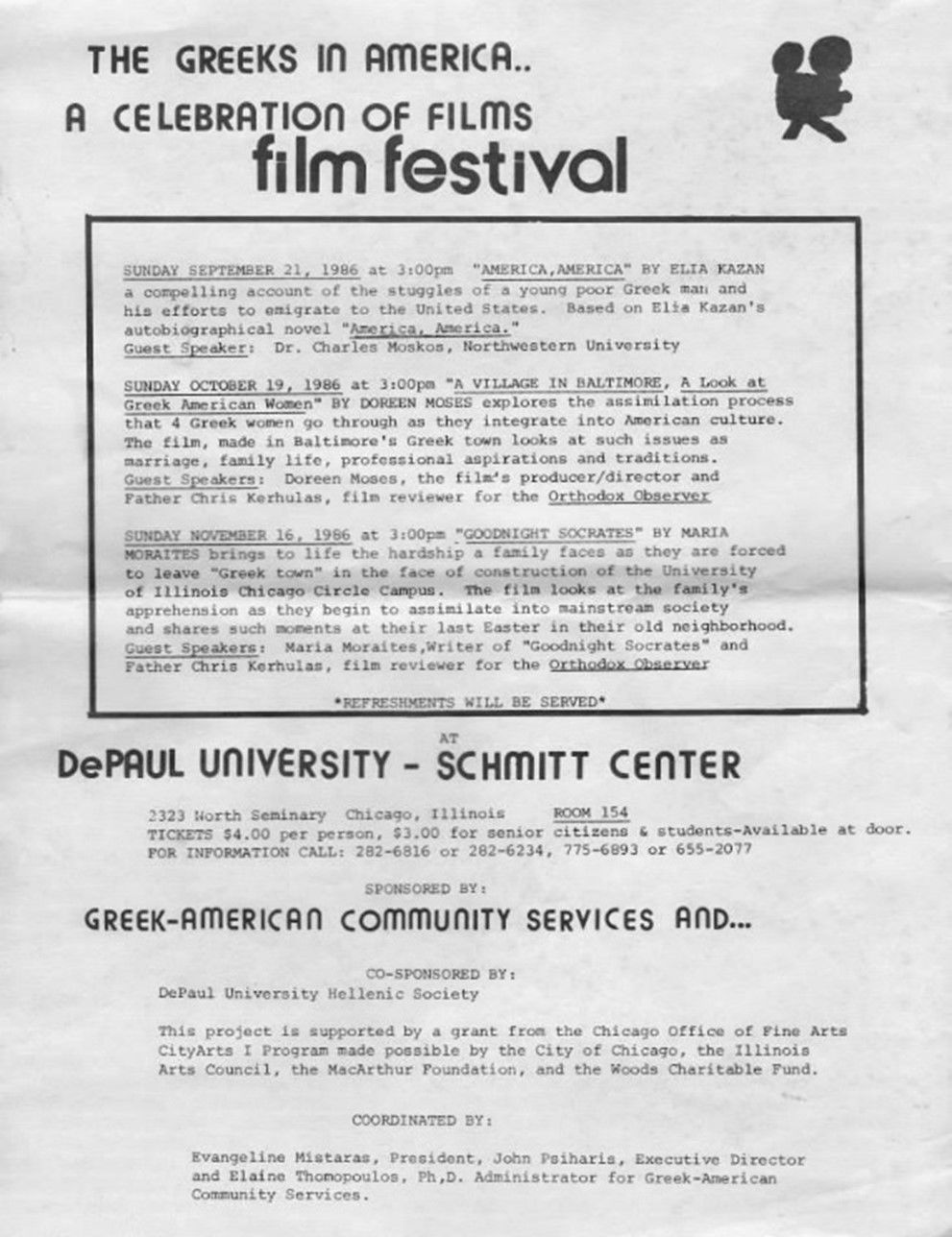The Greeks in America: A Celebration of Films
From Working to Preserve Our Heritage: The Incredible Legacy of Greek-American Community Services:
"At about the same time, work began on a grant proposal for the City Arts program. GACS requested funding to host a series of films that focused on the Greek American experience. Evangeline, as a librarian, helped to select and locate the films. The program was a three-part film series entitled 'The Greeks in America: A Celebration of Films.' Before each screening, a buffet luncheon was served, enabling guests time to get acquainted with the filmmakers, speakers, and each other. After each show, an audience discussion and question and answer period with the filmmakers was held.
The program description as outlined in the City Arts grant proposal explained: 'The film festival will focus on the struggle of the Hellenic people in assimilating into American society and at the same time preserving their heritage and identity. The difficulties and joys that are captured on film by Greek American filmmakers will serve as a starting point for discussion following the films. The filmmakers themselves will be invited to discuss these films immediately following the screening.'
The first film, America, America, set the tone for the series. The award-winning film by famed director Elia Kazan had not been seen for quite some time. Since Kazan was unable to attend, Dr. Charles Moskos, a noted sociologist at Northwestern University and author of The Greeks in America, was the speaker.
The second of the three showings featured two films by Doreen Moses: A Village in Baltimore: Images of Greek-American Women (1981), and One on Every Corner: Manhattan’s Greek-owned Coffee Shops (1986). Doreen was in attendance and participated in the discussions that followed the screenings. Father Chris Kerhulas of St. Basil Greek Orthodox Church provided commentary. Father Chris wrote film reviews for the Greek Star and Orthodox Observer newspapers.
The final film shown in November was Goodnight Socrates. This award-winning documentary focused on the impending loss of much of Chicago’s Greektown in light of the construction of the University of Illinois at Chicago campus. Thousands of Greeks who resided in this area, along with many Italians and other ethnicities, were forced to relocate when Mayor Richard J. Daley chose the area to house the new campus. The writer of the film, Maria Moraities, a professor in filmmaking at Northeastern Illinois University, spoke after the showing. Before each screening, the audience heard a brief presentation about GACS.
With the support of Dr. Andrew Kopan, a professor of education at DePaul University, the Hellenic Society of DePaul University co-sponsored the film series and provided the venue for the event. Elaine Kollintzas, assistant director of alumni relations at DePaul University, was the liaison. About 100 people attended each screening, and a program booklet for the series was created. Advertising in the booklet helped to underwrite the costs of both the book and the series.
Elaine and I recall that at the Schmidt Center, where many of these events were held, some steps were not marked. When the lighting was turned down for the movies, there were always a couple of people who tripped or fell on the steps. We posted volunteers at each entry door to warn people as they entered. By all measures, the film series proved to be a success and helped to establish that GACS had the capability and capacity to organize and promote events of this scale.
